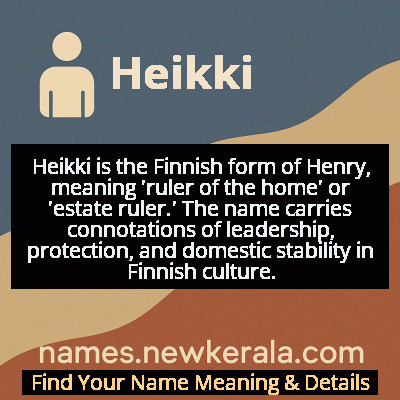Heikki Name Meaning & Details
Origin, Popularity, Numerology Analysis & Name Meaning of Heikki
Discover the origin, meaning, and cultural significance of the name HEIKKI. Delve into its historical roots and explore the lasting impact it has had on communities and traditions.
Name
Heikki
Gender
Male
Origin
Finnish
Lucky Number
8
Meaning of the Name - Heikki
Heikki is the Finnish form of Henry, meaning 'ruler of the home' or 'estate ruler.' The name carries connotations of leadership, protection, and domestic stability in Finnish culture.
Heikki - Complete Numerology Analysis
Your Numerology Number
Based on Pythagorean Numerology System
Ruling Planet
Saturn
Positive Nature
Ambitious, efficient, realistic, and authoritative.
Negative Traits
Materialistic, stressed, confrontational, and can be overly ambitious.
Lucky Colours
Dark blue, black.
Lucky Days
Saturday.
Lucky Stones
Blue sapphire, amethyst.
Harmony Numbers
2, 4, 6.
Best Suited Professions
Business leaders, managers, financial services, law enforcement.
What People Like About You
Leadership, determination, organizational skills.
Famous People Named Heikki
Heikki Kovalainen
Racing Driver
Won the 2008 Hungarian Grand Prix and competed in Formula One for multiple seasons
Heikki Häiväoja
Sculptor and Medal Designer
Designed numerous Finnish coins and commemorative medals, including Finnish markka coins
Heikki Ritavuori
Politician
Finnish Minister of Interior assassinated in 1922, remembered as a martyr for democracy
Heikki Sarmanto
Jazz Composer and Pianist
Influential Finnish jazz musician with over 400 compositions blending folk and jazz
Name Variations & International Equivalents
Click on blue names to explore their detailed meanings. Gray names with will be available soon.
Cultural & Historical Significance
Extended Personality Analysis
Individuals named Heikki are typically perceived as embodying the quintessential Finnish characteristics of reliability, practicality, and quiet strength. They are often seen as natural leaders who lead by example rather than through loud authority, reflecting the name's meaning of 'home ruler' in a modern context. Heikkis tend to be methodical problem-solvers who approach challenges with calm determination and thorough planning. Their personality often combines traditional values with progressive thinking, making them adaptable yet grounded. They are typically family-oriented individuals who value deep, lasting relationships and community connections. While they may appear reserved to outsiders, those who know Heikkis well appreciate their dry wit, emotional depth, and unwavering loyalty. Their strong sense of responsibility and integrity makes them trusted figures in both personal and professional settings. These traits align with the Finnish cultural ideal of balancing individual strength with community responsibility, making Heikki a name that carries significant positive associations in Finnish society.
Modern Usage & Popularity
In contemporary Finland, Heikki maintains a respected position as a classic Finnish name, though its popularity has fluctuated over recent decades. While it was among the most common male names in the mid-20th century, its usage declined toward the end of the century as parents favored more international or modern-sounding names. However, the 21st century has seen a mild revival of Heikki as part of the broader trend toward vintage and traditional names. Current usage patterns show it being chosen by parents who value Finnish cultural heritage, seek a strong traditional name, or want to honor family traditions. The name is particularly popular in regions with strong cultural preservation movements and among families with multi-generational Finnish roots. Despite not ranking among the top names currently, Heikki remains instantly recognizable and carries positive connotations of reliability and authentic Finnish identity, ensuring its continued presence in the Finnish naming landscape.
Symbolic & Spiritual Meanings
Symbolically, Heikki represents the enduring strength of Finnish cultural identity and the values of reliability, leadership, and domestic stability. The name embodies the concept of the quiet protector and wise ruler, reflecting its etymological meaning of 'home ruler' in a metaphorical sense. It symbolizes the Finnish ideal of sisu - that unique combination of perseverance, courage, and resilience that characterizes the Finnish spirit. Heikki also represents the bridge between tradition and modernity, serving as a living connection to Finnish heritage while adapting to contemporary life. Metaphorically, the name suggests a person who provides stability and guidance, much like a lighthouse in stormy seas. It carries connotations of authenticity, genuineness, and deep-rooted values that withstand the test of time. In a broader cultural context, Heikki symbolizes the continuity of Finnish identity across generations and the preservation of cultural traditions in an increasingly globalized world.

